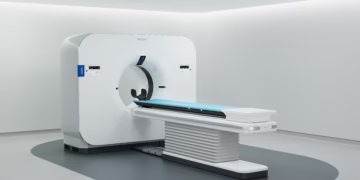Apr 02, 2019
- Advancing Care Coordination & Telehealth Deployment at Scale (ACT@Scale) Handbook now available to implement and grow population health management to improve patient care and reduce costs in an aging society
- Analysis from three-year telehealth deployment in the UK, the Netherlands, Germany, Denmark, and Spain delivers best practice standards for deployment of digital care coordination at scale
Amsterdam, The Netherlands and San Sebastian, Spain – Royal Philips (NYSE: PHG, AEX: PHIA), a global leader in health technology today announced the results of the Advancing Care Coordination & Telehealth Deployment at Scale (ACT@Scale) Program during the 19th annual International Conference on Integrated Care in San Sebastian, Spain. ACT@Scale is the first of its kind initiative to explore the organizational and structural processes needed to successfully implement care coordination and telehealth services on a large scale. Published results of the three-year program across six European regions are now available, along with recommendations for best practices in connected care.
The World Health Organization (WHO) has established the target goal of a 25% relative reduction in risk of premature mortality from cardiovascular diseases, cancer, diabetes, or chronic respiratory diseases by 2025 in Europe [1]. Connected care is viewed by many governments as essential to enable more efficient, patient-centric and continuous care for the aging EU population. However, while many local connected care pilot programs are successful, they fail to scale to their full potential.
ACT@Scale builds on the expertise and successful experiences of the ACT program, leveraging tested collaborative methods and tools to implement improvements, and is fully aligned with the European Innovation Partnership on Active and Healthy Aging objectives to deploy integrated care for chronically ill patients. The EU-sponsored project comprises 16 partners from eight EU countries, including 14 programs in six regions coordinated by Philips.
The ACT@Scale handbook contains a host of important recommendations to achieve change at scale and provides an impressive insight into some of the best successes in Europe in care coordination and telehealth to date that we can continue to leverage for future deployments.
Prof. Stan Newman
Vice-President (International), City, University of London
Digital health best practices for large-scale deployment
The ACT@Scale handbook contains recommendations to achieve change at scale, and spotlights examples of success. It identifies best-in-class processes, structures and ways of working across the six participating European regions. Insights and recommendations can be used to build large scale deployment across Europe and beyond.
“We cannot underestimate the efforts made by healthcare organizations in bringing about change in practice in healthcare. Connected care is disruptive to many aspects of current health care practice and overcoming resistance to change and persuading healthcare professionals, patients and their families as well as managers and those who finance care is not an easy task,” said Prof. Stan Newman, Vice-President (International), City, University of London. “The ACT@Scale handbook contains a host of important recommendations to achieve change at scale and provides an impressive insight into some of the best successes in Europe in care coordination and telehealth to date that we can continue to leverage for future deployments.”
Among the findings, four key areas were identified as most essential to scale-up and drive adoption of innovation across connected care and telehealth: Citizen Empowerment; Stakeholder and Change Management; Service Selection; and Sustainability & Business Models. Examples of success across key areas showcased in the findings include the My Diabetes My Way online self-management platform for patients in Scotland, which has reached a high level of patient activation with 22,000 diabetes patients across the nation who can access their medical records online to manage their diabetes more effectively. The Basque Country regional stratification approach has also demonstrated success with its multi-morbid integration program, enabling patients with complex health and social care needs at high risk of hospital or care home admission, to lead fulfilled lives and improved clinical outcomes. The program has succeeded to scale up to 16,000 patients across the region by implementing technology solutions to provide access to personalized care plans based on clinical guidelines, and leveraging data from the EHR (Electronic Health Record).












































